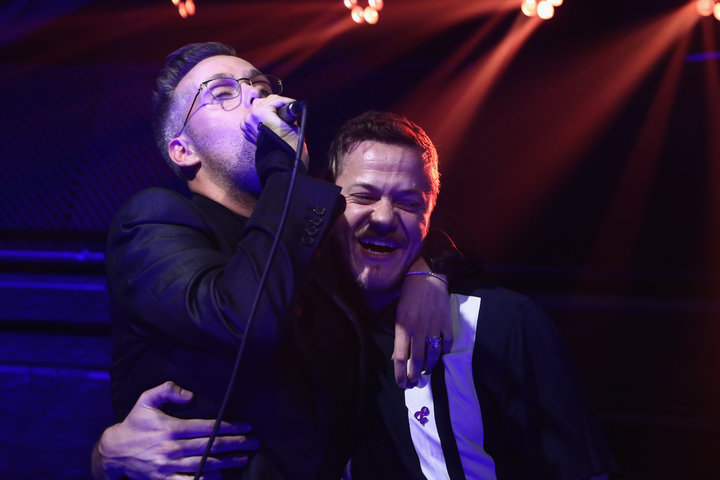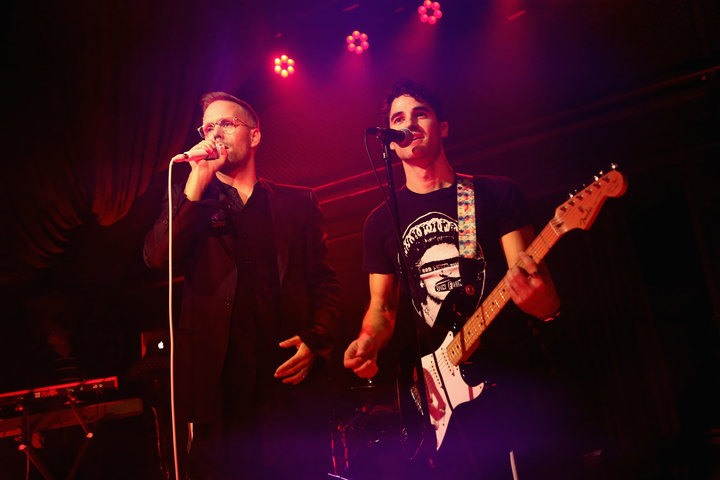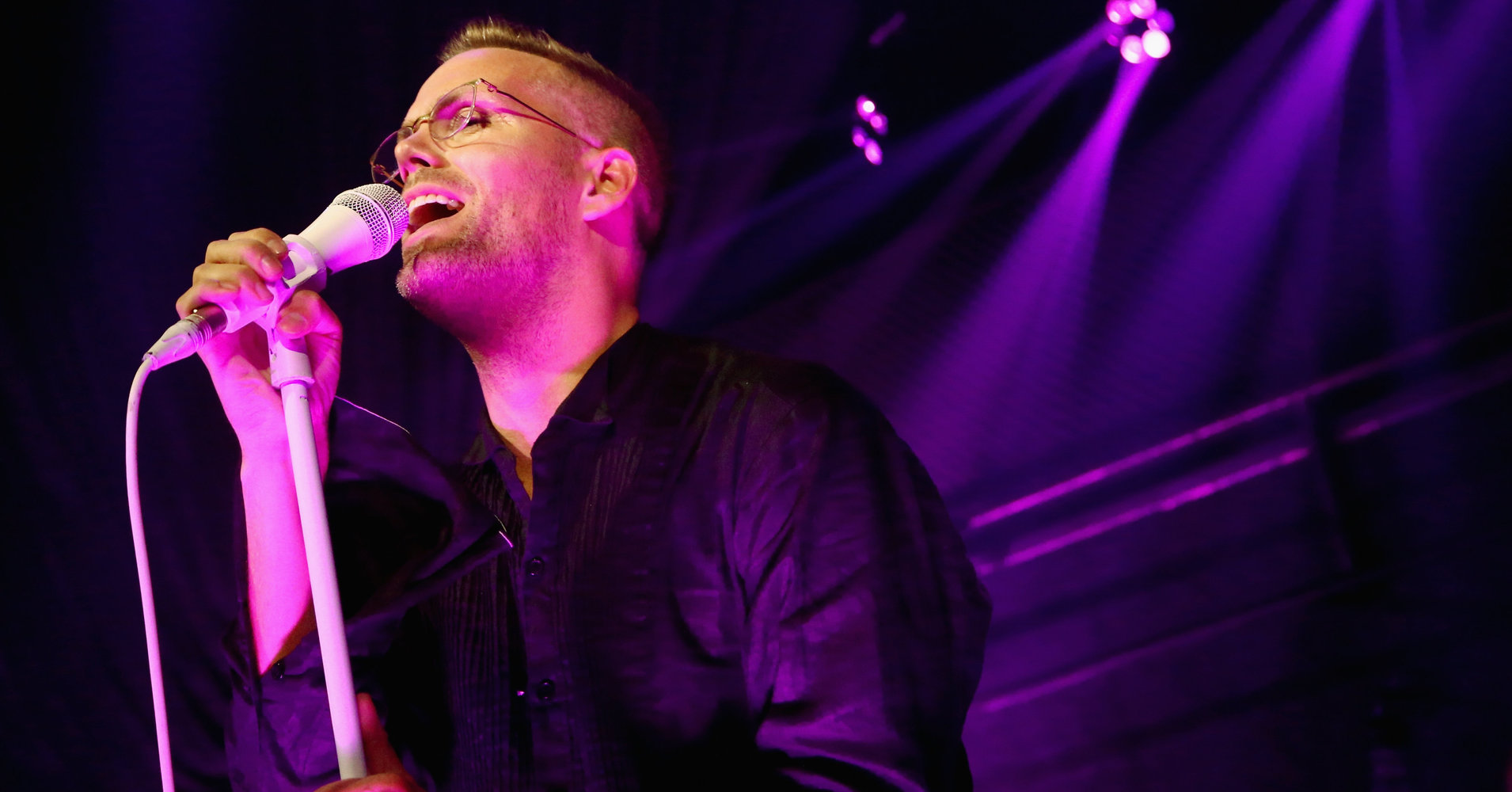[ad_1]
Justin Tranter boasts a discography that reads like a who’s who of Top 40 radio, with Nick Jonas, Camila Cabello and Selena Gomez among his A-list collaborators. But the Illinois-born songwriter, 38, doesn’t measure his success in the number of pop stars he can personally name-drop.
“My job is to help people tell their stories. What makes me proudest is when I’m able to create a space in the studio where people feel confident to say that craziest, most honest shit they’ve ever said,” Tranter, previously the frontman for the rock band Semi Precious Weapons before he began writing for other artists, told HuffPost. “All you can focus on is what happens in the room, and making sure the music’s as good as it can be. That, to me, is success.”
Just as Tranter’s profile has risen in the music industry, his passion for LGBTQ advocacy work has become more profound, too. On Wednesday, he teamed up with GLAAD to stage his second benefit concert in support of LGBTQ youth on Spirit Day at The Sayers Club in Los Angeles. The show, which saw Tranter taking the stage alongside Darren Criss and Imagine Dragons frontman Dan Reynolds, highlighted the work of queer songwriters Sarah Aarons and Cameron Forbes and raised a reported $400,000 for GLAAD.
Days before the show, Tranter ― who also co-wrote Lady Gaga’s “Heal Me” for the new remake of “A Star Is Born” ― spoke to HuffPost about his artistic process, his philanthropic causes and how being bullied for identifying as gay as a teen shaped his future career.
Congrats on your second Spirit Day concert with GLAAD. Why is that day important to you?
Being on the board of GLAAD is one of the most mind-blowing, inspiring things. When I was talking to them about what I could do with my reach to pay my privilege forward … doing something for Spirit Day really, really jumped out at me.
My public school experience ― from grade school through junior high ― was as bad as it could be in terms of bullying. I wish that something like Spirit Day existed when I was a kid. To have that moment every year where there’s all this visibility of LGBTQ people, teachers, celebrities, allies, fellow students would’ve meant so much to me. Safety shouldn’t be a privilege; safety should be a basic human right. I wanted to do everything that I could to highlight such an amazing day.

Tommaso Boddi via Getty Images
We’re living in a time when openly LGBTQ stars like Sam Smith, Kim Petras and Troye Sivan have made great strides in pop music. What do you see as the next hurdle for queer representation in the industry?
Those artists have broken a lot of barriers. [But] I think we definitely need queer artists of color to have their perspectives, voices and music heard on the most mainstream scale possible, and we need as many as possible. Our community is so beautifully diverse. Until we can have pop stars at the top of the charts that represent all of the diverse aspects of our community, our job is not done.
What role do you think artists should play in moving the conversation on LGBTQ rights forward?
We do have a couple big queer pop stars doing amazing things right now, but two or three isn’t really nearly enough when you look at the whole landscape. The more that the diversity of our community shows up in the mainstream, the more that hearts and minds will change, and the more that politics will change. Hearts and minds change politics, not politicians.
When you spoke to HuffPost in January, you said the world was in a “terrifying place” and called the Trump administration “the scariest that the LGBTQ community has faced ― maybe ever but certainly in decades.” Where’s your head at now as far as America is concerned?
It’s just gotten even scarier. The media, in some ways, is more diverse than ever, while politics are getting narrower than they’ve been in a very, very long time. I always stay positive about everything because it’s just a more fun place to be. But there’s a lot of work, and a lot of voting, that needs to be done. I hope it inspires others, and myself, to do more work to try to make change.
Watch Tranter and Criss sing “Issues” in the video below.
You worked with Christina Aguilera on her new album, “Liberation,” which received critical acclaim but was ignored by radio. How much do a song’s sales figures and airplay matter to you as a pop songwriter?
Christina’s a hero to the world and is kicking ass on her tour right now, and our song is awesome. That’s all that matters to me. Anytime a video of her singing her ass off in concert pops up on my Twitter or Facebook feed, it makes me proud to have been a part of this latest piece of her journey.
I measure my success in how much I’m able to pay my privilege forward. It’s all based on how much I can open doors for people who need those doors open … how I can make other LGBTQ people’s lives in this business easier than mine was.
You recently donated money to build a recording studio and a production lab at your alma mater, the Chicago Academy for the Arts. What inspired this?
When I attended public school in Chicago, the bullying ― verbal, physical ― was as bad as it could be. Halfway through my freshman year of high school, my parents found the Chicago Academy for the Arts for me. That school changed my life; it saved my life. There were openly LGBTQ students and teachers. It was a much more racially diverse place, too. It made me the artist and the person I am today. The minute I had enough money to do something special for that school, I did. It makes me really proud, because it’ll not only give them a way to compete at the most modern creative level, but it will also give them employable skills. Engineering and producing are very employable skills in this business.

Tommaso Boddi via Getty Images
Why do you think the arts are still so undervalued in public education?
It blows my mind because I think arts education is so important. A lot of kids dream about being superstars ― whether that’s a dancer, a singer, an actor, musician and so on. But parents should also know that arts education is so important in confidence-building and can lead to so much more than just trying to be a star. It can bring so much beauty into a kid’s life. I wish more people would understand that.
Looking ahead, are there specific artists you have high hopes for?
Shea Diamond is one of my favorites. We work together all the time. She’s a trans woman of color and she’s lived a life that, if you saw it in a movie, you wouldn’t believe it. Her perspective is so powerful. King Princess is just unbelievable. Her talent is at the highest level. I’d like Hayley Kiyoko to keep soaring higher and higher. I think her perspective as an Asian-American lesbian is unbelievably needed in this world. Also, she’s really fucking talented, dances her ass off and the whole world should watch it all the time!
This interview has been edited for clarity and length.
[ad_2]
Source link

